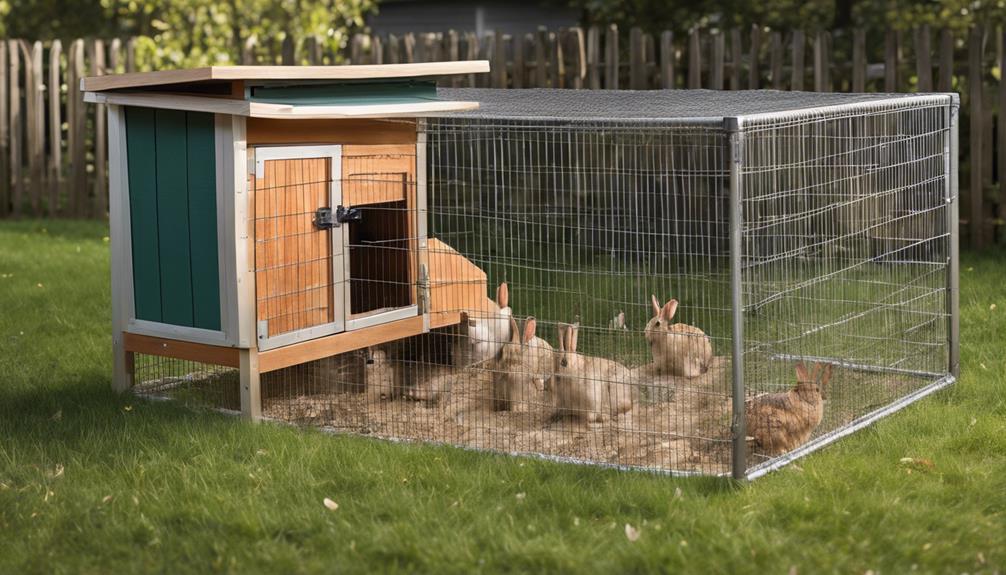Top 10 Tips to Safeguard Rabbits From Predators
To safeguard your rabbits, secure hutches with strong latches, use motion-activated lights to scare off predators, and plant lavender or mint to deter them. Install predator-proof fencing with underground barriers and maintain low-density vegetation. Incorporate guard animals like llamas and employ noise-making devices for added protection. Regularly inspect your defenses, rotate grazing areas, and keep up with maintenance. These tips will help create a safe environment for your rabbits.
Secure Hutches and Enclosures
To protect your rabbits from predators, reinforce the security of their hutches and enclosures by inspecting for any weak spots or gaps that could be potential entry points. Predator proof landscaping around the perimeter of the enclosures can act as a first line of defense. Trim back any overgrown bushes or plants that could provide cover for predators. Additionally, consider installing fencing with buried wire mesh to prevent predators from digging underneath.
Hutch reinforcement is crucial in keeping predators at bay. Check for any loose or rotting parts of the hutch that could be easily breached. Secure hinges and latches to ensure they're predator-proof. Consider adding a predator apron, which is a wire mesh that extends outward from the base of the hutch to prevent digging.
Regularly inspect the enclosures for signs of wear and tear, especially after extreme weather conditions. Replace any damaged parts promptly to maintain the integrity of the structure. Remember, predators are opportunistic and will exploit any weak points in the defense of your rabbits.
Install Motion-Activated Lights
Consider installing motion-activated lights around your rabbit enclosures as a proactive measure to deter nocturnal predators effectively. Lighting solutions play a crucial role in enhancing nighttime protection for your rabbits by creating a well-lit environment that deters potential threats.
Here are four key reasons why motion-activated lights are a valuable addition to your predator prevention strategy:
- Deterrence: Motion-activated lights startle nocturnal predators, making them hesitant to approach your rabbit enclosures. The sudden illumination can disrupt their hunting instincts, causing them to retreat to darker areas.
- Visibility: Improved visibility around your rabbit habitat allows you to monitor any suspicious activity more effectively. The lights can help you identify potential threats and take necessary action promptly.
- Early Warning System: The motion sensors in these lights serve as an early warning system, alerting you to the presence of predators before they get too close to your rabbits. This gives you time to intervene and scare off the intruders.
- Energy Efficiency: Many modern motion-activated lights are energy-efficient, utilizing LED technology to provide bright illumination while conserving power. This ensures that your protective lighting solution is cost-effective and environmentally friendly.
Use Natural Deterrents
Illuminate your rabbit enclosures with natural deterrents to enhance protection against predators in addition to motion-activated lights. Planting repellent herbs like lavender, rosemary, or mint around the perimeter of your rabbit hutch can help ward off potential threats. Predators such as foxes, raccoons, or stray cats are often repelled by the strong scents emitted by these herbs, making your rabbit enclosure less appealing to them.
Another effective natural deterrent is to create decoy nests within your rabbit habitat. By strategically placing fake nests filled with materials like straw or leaves away from where your rabbits actually reside, you can trick predators into targeting the decoy nests instead of the real ones. This diversion can confuse and deter predators, giving your rabbits an added layer of protection.
Utilizing these natural deterrents alongside other safety measures can significantly reduce the risk of predator attacks on your rabbits. Remember that while motion-activated lights provide visibility and scare off some predators, incorporating natural elements like repellent herbs and decoy nests can further fortify your rabbit enclosures against potential threats. By implementing these strategies, you can create a safer environment for your beloved rabbits to thrive in peace.
Implement Predator-Proof Fencing
You can enhance the security of your rabbit enclosures by installing predator-proof fencing designed to prevent unauthorized access by potential threats. Predator-proof fencing is essential in protecting your rabbits from harm. Here are some key tips to consider when implementing predator-proof fencing:
- Electric Wire: Consider adding an electric wire to your fencing system as an effective deterrent against predators. The mild electric shock that the wire delivers can deter animals from attempting to breach the enclosure.
- Underground Barriers: To prevent burrowing predators from gaining access to your rabbit habitats, install underground barriers. These barriers can be made of hardware cloth or dig-proof material to stop predators from tunneling into the enclosure.
- Height and Material: Opt for fencing that's tall enough to prevent predators from jumping over it. Additionally, choose sturdy materials like welded wire or hardware cloth to ensure durability and strength against attempts to break through.
- Regular Maintenance: Inspect your predator-proof fencing regularly to check for any damages or potential weak spots. Repair any issues promptly to maintain the integrity of the enclosure and keep your rabbits safe from harm.
Trim Vegetation Around Habitats
Trimming vegetation around rabbit habitats is essential to reduce hiding spots for potential predators and enhance the visibility and safety of the area. When selecting plants for your rabbit habitat, opt for low-density vegetation that doesn't provide cover for predators. Avoid dense shrubs or tall grass that could shield predators from view. Instead, choose plants that are spaced out, allowing for better visibility across the habitat.
In terms of habitat design, consider creating open spaces within the enclosure where rabbits can easily spot approaching predators. This could involve clearing out dense vegetation in certain areas to create clear lines of sight. By maintaining a more open habitat design, you can help rabbits detect predators early and have a better chance of escaping to safety.
Regularly inspect the vegetation around the habitat and trim any overgrown plants that could potentially provide cover for predators. Keeping the area well-maintained not only reduces hiding spots for predators but also promotes a safer environment for your rabbits. By being proactive in managing the vegetation around the habitat, you can significantly decrease the risk of predator attacks and ensure the well-being of your rabbits.
Opt for Raised Platforms
To further enhance the safety of rabbit habitats, consider incorporating raised platforms as a strategic measure against potential predators. Raised platforms provide rabbits with elevated protection, creating safe zones where they can evade predators effectively. These structures not only offer a physical barrier but also serve as a means for rabbits to escape danger by climbing to a higher vantage point.
Here are four key reasons why raised platforms are essential for safeguarding rabbits:
- Predator Evasion: Raised platforms enable rabbits to stay out of reach of ground-based predators such as foxes, raccoons, and snakes. By having an elevated space to retreat to, rabbits can avoid direct confrontations and increase their chances of survival.
- Enhanced Surveillance: With raised platforms, rabbits have a better view of their surroundings, allowing them to detect potential threats from a distance. This heightened surveillance capability enables them to react promptly to danger and seek refuge on the platform.
- Safe Zones: Raised platforms provide rabbits with designated safe zones within their habitats. These areas offer a sense of security where rabbits can rest, groom, and socialize without the constant fear of predator attacks.
- Escape Routes: In case of imminent danger, raised platforms offer rabbits a quick escape route. They can swiftly ascend to the platform, out of harm's way, until the threat has passed.
Incorporating raised platforms into rabbit habitats is a practical and effective way to enhance their safety and well-being.
Utilize Guard Animals

To enhance the protection of rabbits from predators, incorporating guard animals into their habitats can be a highly effective strategy. Guard llamas are known for their natural protective instincts and can serve as excellent companions for rabbits. Llamas are territorial animals that will often perceive a threat before it even reaches the rabbits. Their alert nature and strong defensive instincts make them great protectors against potential predators like foxes or coyotes.
In addition to guard llamas, training dogs as protectors for rabbits is another effective method. Dogs can form strong bonds with rabbits and are instinctively inclined to protect their territory and companions. Breeds like Great Pyrenees, Maremmas, or Anatolian Shepherds are commonly used as livestock guardian dogs and can be trained to watch over rabbits effectively. When properly trained, these dogs will deter predators and alert you to any potential threats.
Introducing guard animals like llamas and trained dogs into your rabbit's environment can significantly reduce the risk of predator attacks. These animals not only provide physical protection but also offer a sense of security to the rabbits, allowing them to thrive in a safer environment. By utilizing guard animals, you can create a more secure space for your rabbits to live and thrive.
Employ Noise-Making Devices
Enhancing your rabbit's protection from predators can also involve employing noise-making devices as a proactive measure to deter potential threats. These devices can startle predators and alert you to their presence, giving you the opportunity to intervene and protect your rabbits effectively.
To effectively utilize noise-making devices, consider the following tips:
- Sound alarms: Install motion-activated sound alarms around your rabbit enclosure. These alarms emit loud noises when triggered, scaring off potential predators. Place them strategically to cover all angles of the enclosure.
- Noise makers: Utilize noise-making devices such as whistles, air horns, or even pots and pans. Keep these items close by so that if you hear or see a predator approaching, you can quickly make a loud noise to deter them.
- Regularly test the devices: Ensure that your noise-making devices are in working order by testing them regularly. Check the batteries, connections, and volume to guarantee they'll be effective when needed.
- Educate neighbors: Inform your neighbors about the noise-making devices you're using to protect your rabbits. This will prevent misunderstandings if they hear loud noises coming from your property and will help them understand the importance of deterring predators.
Regularly Inspect Perimeter Defenses

Regularly inspecting your perimeter defenses is crucial to ensuring the continued safety and security of your rabbits from potential predators. Conducting thorough inspections of your barriers and fencing is essential to identify any weak points that predators could exploit. Make it a routine to walk around the perimeter of your rabbit housing or grazing area, checking for signs of damage or areas where predators could potentially breach the defenses.
In addition to regular daytime checks, consider conducting night patrols to assess the security of your perimeter defenses after dark when nocturnal predators may be more active. Use a flashlight to inspect fences, gates, and other protective structures for any vulnerabilities that could compromise the safety of your rabbits. By conducting these nighttime inspections, you can ensure that your rabbits are protected round the clock.
Reinforcing barriers is another critical step in safeguarding your rabbits from predators. Repair any damaged fencing promptly and consider adding extra layers of protection such as digging barriers or predator-proof mesh. By reinforcing your perimeter defenses, you create a more formidable obstacle for predators, reducing the likelihood of successful attacks on your rabbits. Remember, a strong and well-maintained perimeter is key to keeping your rabbits safe from harm.
Rotate Grazing Areas
Consider rotating the grazing areas of your rabbits to minimize the risk of predation and maintain optimal foraging conditions. Grassland management plays a crucial role in protecting your rabbits from predators, as it can disrupt the patterns that predators rely on for hunting. By regularly moving your rabbits to new grazing areas, you can reduce the likelihood of predators targeting them and ensure that the vegetation remains fresh and nutritious for your rabbits' consumption.
To effectively rotate grazing areas for your rabbits, follow these tips:
- Monitor Predator Behavior: Keep an eye on any signs of predator activity in the current grazing area. If predators are frequently spotted nearby, it may be time to move your rabbits to a different location.
- Utilize Temporary Fencing: Set up temporary fencing to create smaller grazing paddocks within a larger area. This allows you to rotate your rabbits between paddocks while keeping them safe from predators.
- Implement Rest Periods: Allow grazing areas to rest and regenerate after use. This practice promotes healthier vegetation growth and reduces the buildup of predator attractants.
- Diversify Vegetation: Introduce a variety of plants in different grazing areas to discourage predators that may specialize in hunting specific prey species. Diverse vegetation also provides better nutrition for your rabbits and supports overall ecosystem health.
Frequently Asked Questions
Can Rabbits Sense Danger From a Distance?
Yes, rabbits can sense danger from a distance through their keen predator recognition skills. When a potential threat is nearby, rabbits exhibit instinctual reactions like freezing or fleeing to avoid being caught.
Their acute senses of hearing and smell help them detect predators early, giving them a chance to escape. This survival mechanism has evolved over time to help rabbits stay safe in the wild.
Do Motion-Activated Lights Scare off Predators?
Motion-activated lights can be effective at scaring off predators due to their sudden brightness catching them off guard. Predators with night vision can be deterred by the sudden illumination.
However, there's a possibility of false alarms triggering the lights unnecessarily. Understanding predator behavior and strategically placing these lights can enhance their effectiveness in safeguarding your rabbits.
Are Guard Animals Like Dogs Safe for Rabbits?
Guard animals like dogs can be safe for rabbits if introduced properly. Some guard animal options can help protect rabbits from predators due to their natural instincts. When choosing a guard animal, consider the temperament and training needed.
Rabbit behavior may also play a role in how they interact with guard animals. Supervision is key to ensure the safety of both rabbits and the guard animals.
How Often Should Perimeter Defenses Be Inspected?
Regular inspections of your perimeter defenses are crucial to ensuring the safety of your rabbits. By checking for any weak spots or signs of wear, you can proactively address potential vulnerabilities.
Implementing preventative measures such as reinforcing fencing or adding motion-activated lights can help deter predators. Stay vigilant and conduct inspections routinely to maintain a secure environment for your rabbits.
What Are Effective Natural Deterrents for Predators?
To deter predators naturally, consider using plant-based deterrents like lavender, marigolds, or garlic. These plants emit scents that many predators find unpleasant.
Additionally, predator decoys can be effective in deterring unwanted visitors. Strategically placing decoys like fake owls or snakes around your rabbit's habitat can trick predators into thinking there's a threat present, keeping your rabbits safe.
Conclusion
In conclusion, by following these top 10 tips to safeguard your rabbits from predators, you can ensure the safety and well-being of your furry friends.
Taking proactive measures such as securing hutches, using natural deterrents, and implementing predator-proof fencing will help create a secure environment for your rabbits to thrive in.
Remember to regularly inspect perimeter defenses and rotate grazing areas to further protect your rabbits from potential threats.
With these precautions in place, you can enjoy peace of mind knowing your rabbits are safe and sound.
